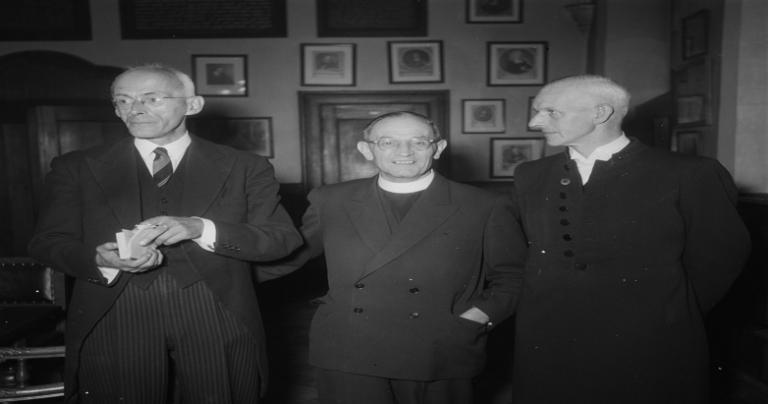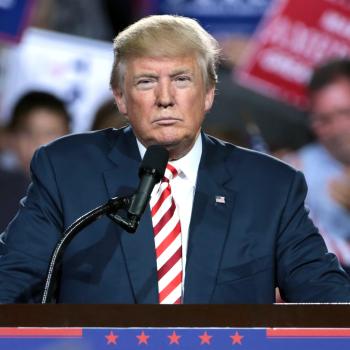Not long before the 2016 election, one of my posts here mentioned the notion that American Christians faced a “Bonhoeffer moment.” While the phrase had originated with political conservatives like Ronnie Floyd and Eric Metaxas, their opponents also appealed to the example of the famous German theologian. Would religious conservatives choose the costly path of conscientious resistance, they asked, or make common cause with so odious a candidate as Donald Trump?
Clearly, the vast majority of white evangelicals — plus slightly smaller majorities of white Catholics and mainline Protestants — failed that test. Some actually embraced Trump’s malice: they thrilled to hear echoes of their own anger and fear in the racism, misogyny, xenophobia, and anti-intellectualism that our president has rarely bothered to conceal. Others — I want to believe most — convinced themselves that Trump was the “lesser of two evils.”
The latter group may be especially well represented in a recent study. The more likely Trump voters were to attend church, the bipartisan Voter Study Group found, the more likely they were to feel favorably about racial minorities and immigrants—the people Trump is most likely to demonize… the more likely they were to support immigration reform—and reject Trump’s persistent call for a border wall… the more likely they were to value racial equality and poverty reduction—neither priorities of the Trump administration.
So if it’s becoming clearer and clearer to them there’s a difference between their values and the president’s, are these Christians finding it harder and harder to rationalize their support for Donald Trump?
Historian Neil Young isn’t convinced:
If there are white evangelicals who now express hesitation or discomfort with some of the president’s other policies or with his unsavory character, it doesn’t change the fact that those same voters were crucial to his election. For all of us living under the Trump administration, it doesn’t matter how enthusiastically or not white evangelicals feel about the president. What matters is the fact that their votes are what allowed him to pursue his dangerous agenda in the first place.
Put another way: for the American Christians who supported Trump, the Bonhoeffer moment has already passed.
Now they face a Niemöller moment.

A Protestant pastor like Bonhoeffer, Martin Niemöller was arrested by the Nazi state in 1937, imprisoned in Dachau and other concentration camps, and eventually became a leading figure of the postwar West German church — a living symbol of resistance and repentance, perhaps best known for this much-adapted confession:
First they came for the socialists, and I did not speak out—because I was not a socialist.
Then they came for the trade unionists, and I did not speak out— because I was not a trade unionist.
Then they came for the Jews, and I did not speak out—because I was not a Jew.
Then they came for me—and there was no one left to speak for me.
Actually, Niemöller didn’t speak out simply because he didn’t identify with those groups; he saw them as threats to Germany and to Christianity. Initially inclined to accept Hitler as a fellow nationalist, the former U-boat captain and Freikorps fighter came to his anti-Nazism gradually.
Even as Niemöller tempered his initial enthusiasm for a dictator who tried to extend his reach to the churches of Germany, Dietrich Bonhoeffer questioned the motives of his fellow Confessing Church leader, scoffing that “dreamers and the naïve like Niemöller still believe they are the true National Socialists.” Arguably, it wasn’t until after the war, after his own experience in Dachau, that Niemöller fully realized just how evil was the regime that he had once preferred to the Weimar Republic.
In a recent Christian Century essay adapted from his new biography of Niemöller, Matthew Hockenos warns:
It is tempting for admirers to rationalize Neimöller’s [sic] earlier years by speaking in terms of a clean break between a young, imprudent man, on the one hand, and a mature, wiser man, on the other. But Niemöller was a 41-year-old father of six with two decades of professional experience when he applauded Hitler’s ascension to power. He was a middle-aged man who had read Mein Kampf and knew very well what Hitler stood for. And even after he watched Hitler abolish the national parliament, ban political parties and trade unions, and persecute his opponents, Niemöller refused to distance himself from radical nationalism and anti-Semitism—even on occasion after 1945.
At moments during Hitler’s reign, when Niemöller felt compelled to speak out at the risk of his liberty and life, and then as he stood outside Dachau after the war and recognized the full human cost of Nazism, the Confessing Church leader realized that he had been wrong and chose to resist and repent. “Once the legend is stripped away,” concludes Hockenos, “Niemöller necessarily disappoints us. But the imperfection of his moral compass makes him all the more relevant today. This middle-class, conservative Protestant, who harbored ingrained prejudices against those not like him, did something excruciatingly difficult and uncommon for someone of his background: he changed his mind.”
Relevant, indeed. Churchgoing evangelicals and other American Christians who supported Donald Trump deeply disappoint me. But however imperfect their moral compass, it can still guide them: they can still change their mind and oppose the man for whom they once cast a ballot.
What would this look like? A good start would be to back words with action: e.g., not only to tell a pollster that they feel positively about immigrants, but to take part in resettling what few refugees this country now accepts; not just to mouth platitudes about racial equality, but to seek after it in their own racialized congregations and schools, businesses and neighborhoods. For pastors, the Niemöller moment might come in the pulpit, where they can choose to proclaim the political (if not partisan) implications of a Gospel that promises good news for the poor and oppressed… even if it costs them the numbers we too often use to judge successful leadership.
If nothing else, American Christians will experience a Niemöller moment this November, when they return to the polling stations where they made their choice in 2016. Donald Trump’s name will not be on the ballot six weeks from today. But that slip of paper or electronic screen will list the names of men and women who have endorsed Trump’s values, enabled Trump’s conduct, or simply refused to hold Trump accountable for his actions. “The truth is,” Young concluded, “that the political context we all must live in is created by the selections voters make, not by the level of enthusiasm with which they made that choice. With that in mind, white evangelicals who have chosen to voice their tepid feelings about Trump to survey takers could register a far more powerful reflection of those views by voting for Democratic candidates in November’s midterm elections.”
Here an already flawed analogy breaks down entirely: unlike Niemöller and his flock, we still have the chance to resist a wicked regime through the act of voting.













